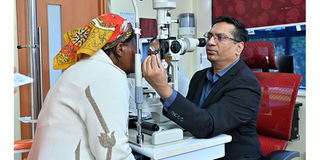About glaucoma and why you too should have your eyes checked
Sponsored by Lions SightFirst Eye Hospital

ByEunice Sigei
Eye specialist, Dr Zelalem Wudineh, was attending to one of his patients aged 65, who had been accompanied by his younger brother. This patient had previously been diagnosed with moderate glaucoma, and had come to the clinic for the regular check.
Before they left, Dr Zelalem asked the patient’s brother whether he had ever had his eyes checked. He said he hadn’t, adding that his vision was just fine.
The doctor casually asked to examine him, and he agreed. Interestingly, he was found to have advanced glaucoma – a level worse than what his older brother – the regular patient – had been diagnosed with.
Glaucoma is an eye condition where the optic nerve, which connects the eye to the brain, becomes damaged. It is usually caused by fluid building up in the front part of the eye, increasing pressure.
Glaucoma can lead to loss of vision if it is not diagnosed and treated early. It does not usually cause any symptoms, to begin with. It tends to develop slowly over many years, and affects the edges of your vision (peripheral vision) first.
For this reason, many people do not realise they have it, and it’s often only picked up during a routine eye test. That is why it is referred to as the silent thief of sight.
If you notice any of the following symptoms – blurred vision or seeing rainbow-coloured circles around bright lights – go for a check. Occasionally, glaucoma can develop suddenly and cause intense pain in the eye, nausea, red eyes, headache, and tenderness around the eyes. Both eyes are usually affected, although the condition may be worse in one eye.
Glaucoma cannot be cured completely, but it can be managed through eye drops, laser treatment, and surgery.
At Lions SightFirst Eye Hospital, we urge everyone to have their eyes checked at least twice a year. This will help catch eye ailments early.
_______________
The writer is the Marketing In-Charge at Lions SightFirst Eye Hospital


